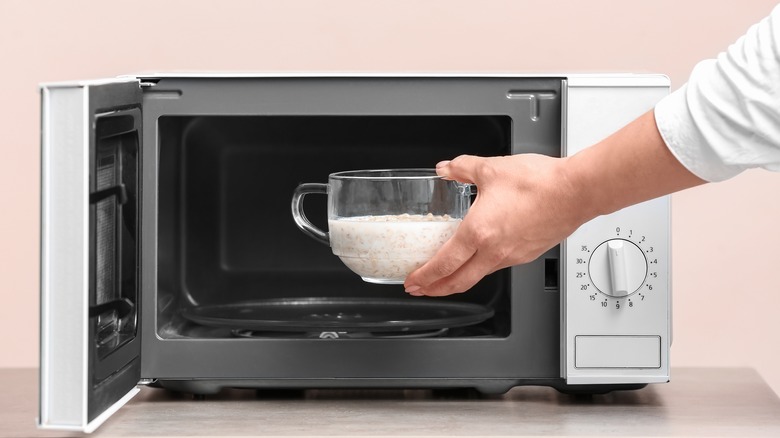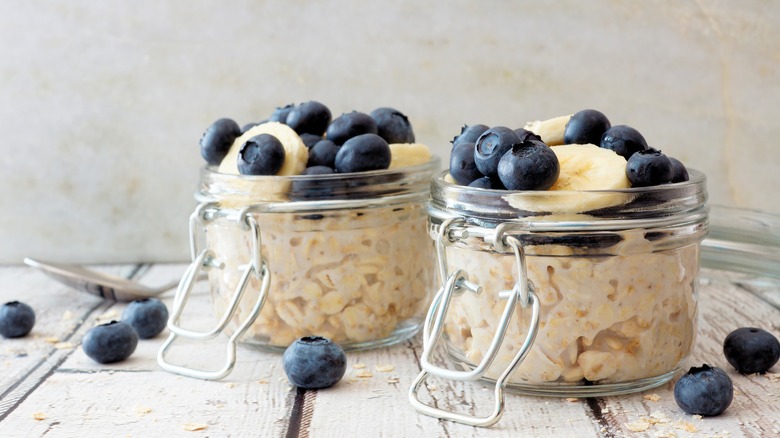Finally, A Way To Stop Oatmeal From Overflowing In The Microwave
For many of us, oatmeal ticks all the boxes for a great meal: it's nutritious, affordable, versatile, and adaptable to many diets. In terms of nutrition, you'd be hard-pressed to find an option with more fiber and vitamins while remaining low-fat and cholesterol-free. Oatmeal's popularity stems mainly from its convenience factor; after all, it's hard to beat a quick microwaveable breakfast that's healthy to boot. But there are certainly a few mistakes to avoid when cooking oatmeal, especially in the microwave. Things can go from tepid to boiling over in a flash, and you don't want to add stuck-on oatmeal to your kitchen spring cleaning list. Fortunately, adopting just a couple of microwave strategies can save your breakfast from disaster.
A top strategy is as easy as soaking the oats overnight. This reduces required cooking time and, therefore, the likelihood of a boil-over. (You can also enjoy the cold oatmeal from the fridge.) If you're looking for an easy oatmeal hack, folks, this is it. What could be easier than popping the oats and water in a jar that night before you need it? It gives your sleepy-eyed morning self the gift of an effortless meal while you get your caffeine fix going.
Soak your oats overnight
This soaking method works well because it allows the liquid to penetrate the grain's exterior before heating to shorten cooking time. The result is a softer, creamier texture since more liquid is absorbed into the oat's interior. There's no absolute for an optimal soaking timeframe, but many connoisseurs suggest "overnight" translates into at least 12 hours. It's also important to note the proper amount of liquid to ensure the right consistency for overnight oats. We suggest twice as much liquid as oats to achieve the ideal texture.
Water-soaked oats are less prone to scalding compared to oats soaked in milk if the dreaded boil-over does occur. However, milk (or a delicious plant-based milk alternative) adds a serious nutrition punch with extra protein, calcium, potassium, and B vitamins. You can probably guess which cooking medium your dietitian would recommend. Fortunately, both liquids prevent boil-over via reduced cook time, so the choice is yours.
When discussing microwaveable oatmeal, let's be sure we're on the same page about which type of oatmeal to use. While there's a difference between quick oats and instant oats in terms of processing, both are suitable for microwave cooking. Steel-cut and rolled oats are less processed than their counterparts, which means a thicker outer layer for the liquid to penetrate during soaking. Some recipes use them for overnight cold oats, but if you love a softer texture, these varieties will need additional cooking time to become tender.
Fatten things up
Here's a bonus if you're looking for another spillage-stopping strategy: add a fat source to the oats before cooking. Fats can help air bubbles escape from oatmeal's starchy net when heated, and escaping steam means fewer air bubbles pushing your oatmeal up and out of your bowl. Nut butters are among the favorite fats to add to your breakfast.
Even when soaking your oats and adding a delicious fat source, you can further reduce your chances of a boil-over by using a bigger bowl. Find a wide, tall-rimmed bowl with at least double the volume of your pre-cooked porridge. You may even want to consider a sizeable ceramic soup mug if you can't find a cereal bowl big enough.
Just because you want a healthy and versatile staple for breakfast doesn't mean you have to resort to the stovetop. You can still enjoy the mess-free convenience of the microwave with a few easy tweaks to your oatmeal prep. Your heart (and kitchen sponge) will thank you.


